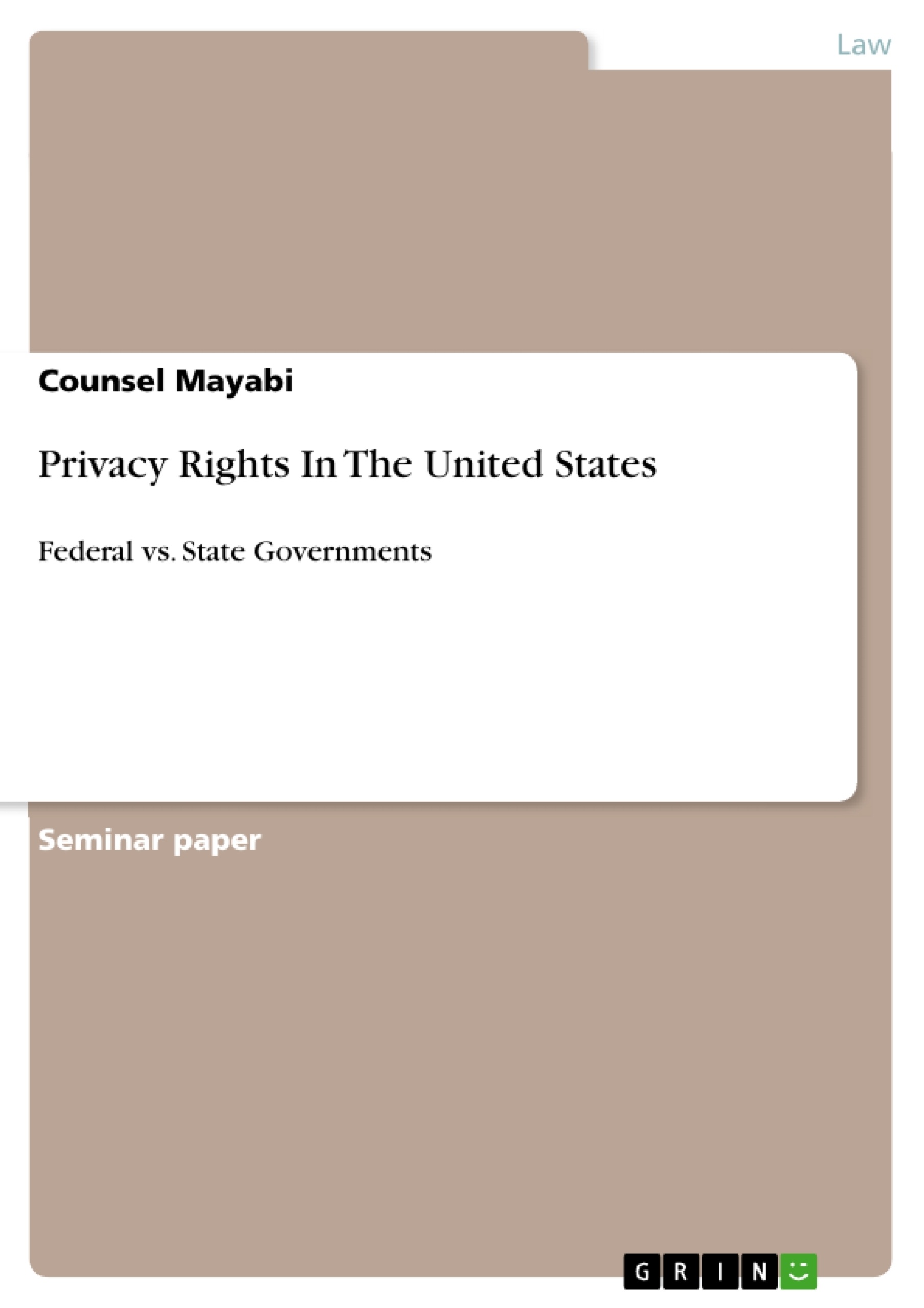The topic on privacy of the people has been a concern for many recently. This is because governments have been seeking to get personal information about citizens for purposes of maintaining security and taming terrorism. The foregoing is not acceptable as everyone is entitled to the right of privacy and no one should be allowed to deny anyone that liberty to have privacy. The paper therefore seeks to discuss how privacy issues have been dealt with in the US especially how the Federal and State governments apply restrictions to the topic.
Inhaltsverzeichnis (Table of Contents)
- Introduction
- Implications For Federalism On Privacy Rights
- Discuss Federal Implications For Civil Rights In Relation To Privacy Rights.
Zielsetzung und Themenschwerpunkte (Objectives and Key Themes)
This paper explores the complex relationship between federalism and privacy rights in the United States, focusing on the potential for the federal government to overstep its constitutional boundaries in pursuit of information. The paper examines the implications of this tension for both privacy rights and civil liberties, highlighting the need for a balance between national security and individual freedoms.
- The potential for federal government overreach in matters of privacy, despite constitutional limitations.
- The conflict between state and federal laws regarding privacy rights, particularly in the context of law enforcement.
- The impact of technological advancements on privacy rights, particularly in relation to data collection and sharing.
- The importance of balancing individual rights with national security concerns, particularly in the context of terrorism and other threats.
- The role of public policy in protecting privacy rights and civil liberties.
Zusammenfassung der Kapitel (Chapter Summaries)
Introduction
This chapter sets the stage for the paper by discussing the historical development of federalism in the United States and its impact on the balance of power between the federal and state governments. It also introduces the concept of privacy rights as a fundamental right that is often threatened by government overreach.
Implications For Federalism On Privacy Rights
This chapter delves into the specific challenges that federalism poses to the protection of privacy rights. It examines historical court cases, such as Olmstead vs. United States (1928) and Katz v. United States (1967), to illustrate how federal law enforcement agents have sought to circumvent constitutional protections of privacy. The chapter also discusses the potential for state governments to infringe on their citizens' privacy rights, highlighting the need for a clear division of responsibilities between the federal and state governments.
Discuss Federal Implications For Civil Rights In Relation To Privacy Rights.
This chapter explores the broader implications of federalism for civil rights, focusing on the intersection between privacy rights and other protected liberties. It argues that the government's pursuit of national security must be balanced with respect for individual rights and liberties, and that technological advancements have created new challenges for protecting privacy in the digital age.
Schlüsselwörter (Keywords)
Federalism, privacy rights, civil rights, civil liberties, national security, data collection, surveillance, technology, public policy, constitutional rights, government overreach, state laws, federal laws, Fourth Amendment.
Frequently Asked Questions
What is the main conflict regarding privacy rights in the US?
The main conflict lies between the government's need to collect personal information for national security and anti-terrorism purposes versus the individual's right to liberty and privacy.
How does federalism impact privacy rights?
Federalism creates a tension between state and federal laws. While the federal government may seek broad surveillance powers, state laws and constitutional limits often restrict these actions to protect citizens.
Which court cases are significant for US privacy law?
Key cases include Olmstead vs. United States (1928), which initially allowed wiretapping, and Katz v. United States (1967), which established that the Fourth Amendment protects people, not just places.
What role does the Fourth Amendment play?
The Fourth Amendment protects citizens against unreasonable searches and seizures, forming the legal bedrock for privacy rights against government overreach.
How has technology changed the privacy landscape?
Technological advancements in data collection and sharing have made it easier for governments to monitor citizens, creating new challenges for public policy and the protection of civil liberties.
- Quote paper
- Counsel Mayabi (Author), 2015, Privacy Rights In The United States, Munich, GRIN Verlag, https://www.grin.com/document/295899



